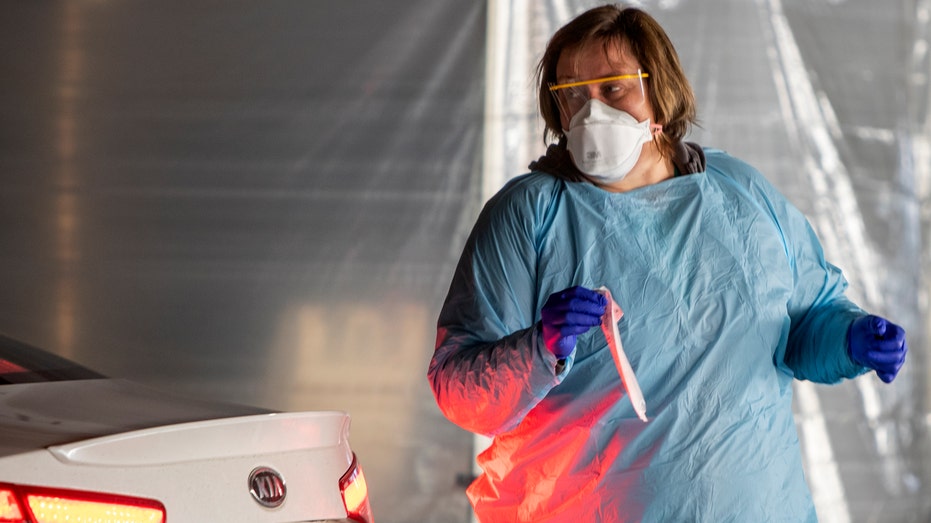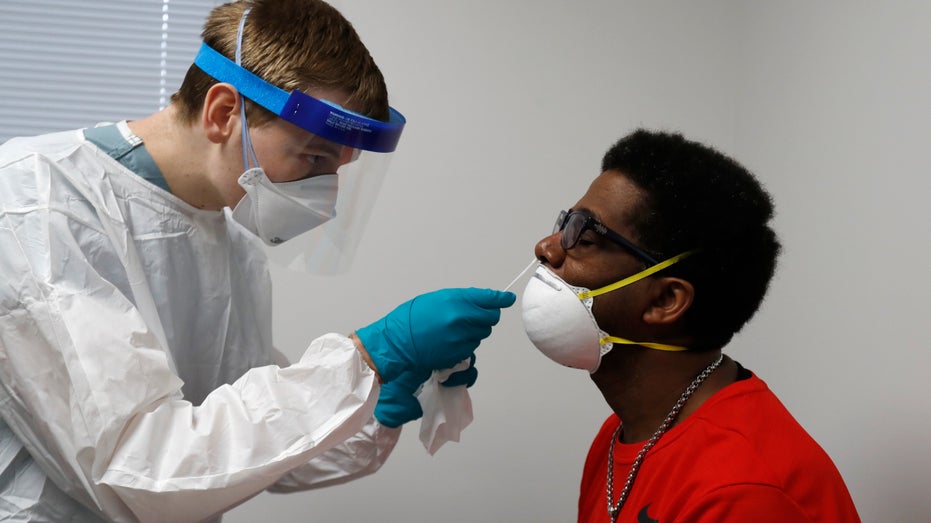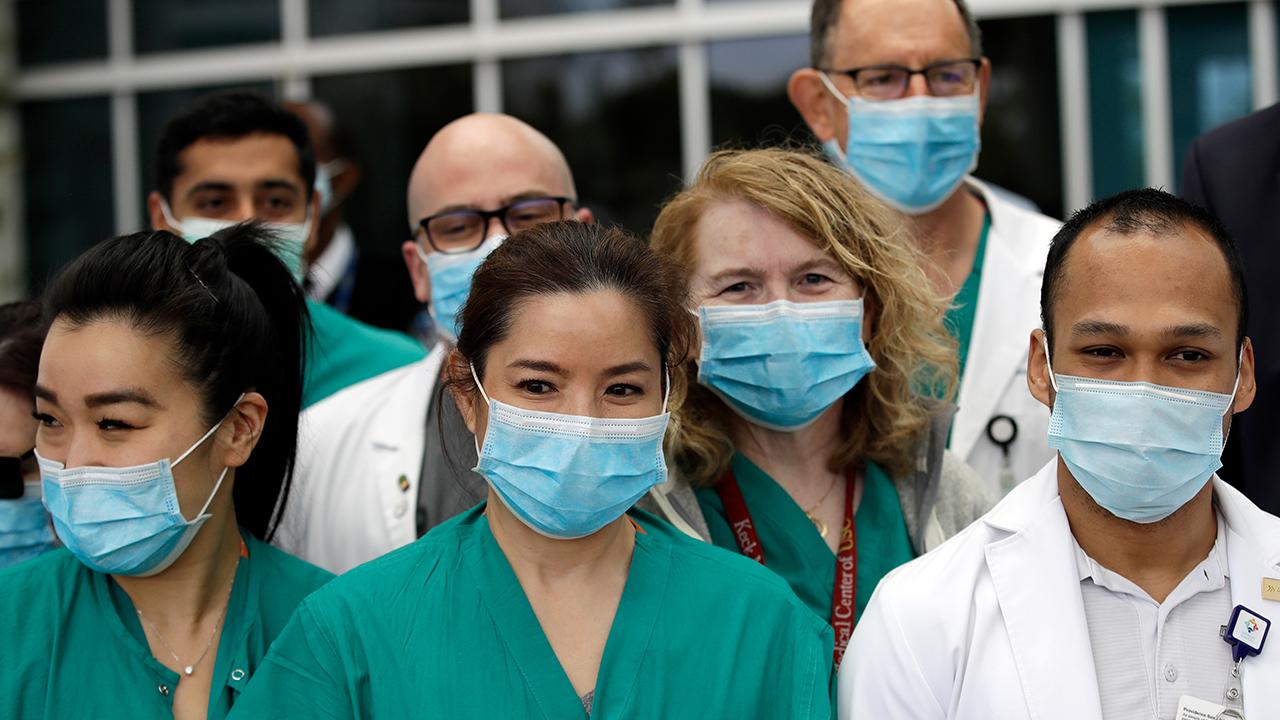Coronavirus testing capacity is going unused
Lab executives and public-health officials blame barriers including fragmented supply chains
Get all the latest news on coronavirus and more delivered daily to your inbox. Sign up here.
Many commercial and academic laboratories in the U.S. are processing coronavirus diagnostic tests far below their daily capacity, leaving tools crucial to slowing the virus's spread unused.
Some labs across the country say they are processing less than a quarter of the diagnostic tests for Covid-19, the illness caused by the new coronavirus, they are equipped to manage. Lab executives and public-health officials blame barriers including fragmented supply chains, relatively strict test guidelines, incompatible electronic systems and a lack of centralized data on where capacity exists.
CORONAVIRUS PATIENT STUDY RAISES QUESTIONS ABOUT WHETHER TEMPERATURE CHECKS WORK
The result is a disorganized system that isn't matching the limited testing supply with the demand, and some public-health experts are calling for national coordination to scale up quickly.
Most tests to diagnose Covid-19 involve taking a nasopharyngeal swab to collect the patient sample and then running the polymerase chain reaction, or PCR, test in a laboratory.

Registered nurse Shelley Oregan test patients for the coronavirus at the Mercy Health Saint Mary's drive-thru testing center in Grand Rapids, Mich., Tuesday, April 28, 2020. (Cory Morse/The Grand Rapids Press via AP)
"We have university laboratories around this country that have the ability to run 1,000 or 3,000 tests per day, yet many of them are nowhere near capacity," said Michael Pellini, managing partner of venture fund Section 32 and a contributor to the Rockefeller Foundation's national Covid-19 testing action plan. "We need to make sure they're utilized."
AMAZON BUYS THERMAL CAMERAS FROM CHINESE COMPANY ON US BLACKLIST
Members of the American Clinical Laboratory Association, which include testing giants Quest Diagnostics and LabCorp, also aren't receiving test orders in numbers to match their full capacity, said Julie Khani, ACLA's president. The companies, some of which previously had backlogs of several days following an initial flood of orders, now are contacting physicians to let them know they have unused resources.
Covid-19 test access varies widely across the country, with some sites making tests available only to patients with severe symptoms and to front-line health and public-safety workers. Other sites offer tests to people with mild symptoms and all essential workers.
| Ticker | Security | Last | Change | Change % |
|---|---|---|---|---|
| DGX | QUEST DIAGNOSTICS INC. | 190.71 | -1.59 | -0.83% |
| LH | LABCORP HOLDINGS INC. | 277.49 | -0.77 | -0.28% |
On Monday, the Centers for Disease Control and Prevention broadened its priority for testing, adding symptomatic first responders and people in longterm-care facilities, prisons and shelters to the top tier. The priority list for the first time includes people without symptoms, at a clinician or public-health authority's discretion, though they aren't the highest priority.
Many companies say widespread worker testing is part of their return-to-work plans.
CORONAVIRUS FACE MASKS, SEPARATED SLOTS, MORE CLEANING ONCE CASINOS REOPEN
Last week, the Trump administration provided governors with lists of sites with unused testing capacity. States, cities and organizations have started coordinating to expand and work through the logistical barriers.
Labs across the U.S. processed just over 1.5 million Covid-19 diagnostic tests within the past week, according to the Covid Tracking Project. But public-health authorities say the country is still far behind where it needs to be to test suspected cases, isolate them and trace their close contacts -- all necessary to ease out of lockdowns safely.
With the full potential of U.S. hospital, commercial and academic labs unlocked, testing could scale from roughly 1.5 million to 3 million weekly tests within eight weeks, says Rajiv Shah, president of the Rockefeller Foundation.
But then jumping to 30 million weekly tests -- the next phase in the foundation's plan -- would likely require new tech, such as quality rapid tests and at-home testing, he said. The Defense Production Act would also likely need to be invoked, according to the foundation's report.

In this April 24, 2020 photo, Wayne State University medical school student Michael Moentmann swabs Leon Wheeler's nostril at a COVID-19 testing center in Detroit. (AP Photo/Carlos Osorio)
Limited access to basic supplies, such as swabs and chemical reagents, has plagued labs across the country for weeks, and these supply-chain issues persist. But obstacles to scaled-up testing go further to include other logistical barriers and lack of doctor and patient awareness of what's available. Some facilities fear that if they use up their testing supply too fast, they won't be able to get more, lab-testing officials and hospital workers say.
There is currently no centralized nationwide database of testing availability for doctors to consult before sending patients for tests.
San Francisco's Department of Public Health has the ability to process 4,300 diagnostic tests a day at three labs it works with, said Susan Philip, director of infectious-disease prevention and control at the agency. On average, only 500 tests a day are completed for city residents at those labs and others.
The reason for the gap could be that initial guidance was to restrict access to tests and has since evolved, Dr. Philip said. The city aims to use 80% to 90% of its capacity, she said, and last week announced it would expand testing for all private-sector, public and nonprofit essential workers and symptomatic residents who couldn't get tested elsewhere.
The Michigan Department of Health and Human Services last week sent out an alert telling doctors there is unused capacity throughout the state.
NxGen MDx, a laboratory in Grand Rapids, Mich., is processing about 25% of the 7,000 coronavirus diagnostic tests it can handle a day. "The key thing now is getting the word out that the net is wider," said Doug McIntosh, senior director of marketing.
Part of the challenge in making full use of testing capacity is the "deep fracturing of the system," with little coordination between doctors, patients, labs and insurers, said Othman Laraki, chief executive at Color, which conducts coronavirus tests.
Most health systems have contracts with specific labs and sometimes don't stray from them, and some insurers won't pay reimbursement for outside labs, Dr. Pellini of the Section 32 fund said. He adds, however, that such problems are being addressed for Covid-19. Smaller labs often don't have the purchasing power or electronic infrastructure in place to come online easily; those that do sometimes don't have compatible systems, he said.
The University of California, San Francisco, announced Friday it would offer free test results to all 58 county public-health departments in California after setting up a new diagnostic lab. One of the biggest challenges now is the logistics of getting patient samples and information to the lab and then sending the results where they need to go, says Steve Miller, professor of laboratory medicine at UCSF.
GET FOX BUSINESS ON THE GO BY CLICKING HERE
To communicate results with some of the incompatible systems outside of the hospital, the lab faxes them. "As you can imagine, that is not a very scalable thing," Dr. Miller said.
Unused capacity could be put to work in high-risk places like assisted-living facilities, where understanding who is sick helps inform housing and staffing choices, said David Dexter, chief executive of Sonora Quest Laboratories, in Arizona. Many facilities still don't have easy access to testing.
CLICK HERE TO READ MORE ON FOX BUSINESS
Researchers have suggested that infected nursing-home staff who are asymptomatic are a likely source of infections in the facilities, which have tallied thousands of deaths from Covid-19. They have found that separating infected residents from others is difficult when many don't show typical signs of the illness and thus don't get tested.
The organization Mr. Dexter leads is using only 20% of its PCR test capacity, "which I think is a travesty," he said.




















